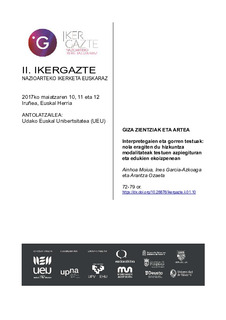| dc.rights.license | Attribution-ShareAlike 4.0 International | * |
| dc.contributor.author | Moiua, Ainhoa | |
| dc.contributor.author | Ozaeta, Arantza | |
| dc.contributor.other | Garcia-Azkoaga, Ines | |
| dc.date.accessioned | 2022-10-13T09:02:08Z | |
| dc.date.available | 2022-10-13T09:02:08Z | |
| dc.date.issued | 2017 | |
| dc.identifier.isbn | 978-84-8438-628-5 | en |
| dc.identifier.other | https://katalogoa.mondragon.edu/janium-bin/janium_login_opac.pl?find&ficha_no=127676 | en |
| dc.identifier.uri | https://hdl.handle.net/20.500.11984/5735 | |
| dc.description.abstract | Lan honen helburu nagusia da hizkuntza modalitate ezberdinek, ahozkoak eta zeinatuak (zehazkiago
esanda, espainiar zeinu-hizkuntzak -LSE-, testu ekoizpenean duten eragina ezagutzea. Lehenik eta
behin, zeinu hizkuntzako interpretegaiek ahoz eta gorrek zeinuz ekoiztutako testuak alderatuko ditugu
Bronckartek (1996) testu-generoen azterketarako proposatutako marko teoriko-metodologikoan
oinarrituta eta hizkuntza modalitate bakoitzaren ezaugarriak ezagutuko ditugu. Bigarrenik,
intepretegaiek zeinuz ekoiztutako testuak aztertu eta ekoizpenean dituzten zailtasunak eta oztopoak
identifikatuko ditugu. Emaitzek balio digute bi ondorio nagusi ateratzeko: batetik, hizkuntzaren
modalitateak ez du testuen azpiegituran eragiten; bestetik, ordea, hizkuntza modalitateak eragina du
edukiak ekoizteko erabiltzen diren ikuspegietan, eta oinarrian talde bakoitzaren errealitate soziodiskurtsiboari lotuta daude | eu |
| dc.description.abstract | The aim of this work is to know the influence of two language modalities, oral and signed (more
specifically the Spanish Sign Language -LSE-) in the texts production. We firstly analyze
comparatively signed texts produced by deaf and signed texts produced by listeners in formation to be
interpreters of LSE. Next, we analyze the texts produced in LSE by the listeners to identify the
difficulties they have in interpreting. The results allow us to draw two conclusions: on the one hand,
that the modality does not affect the structure of the text. On the other hand, however, that the contents
that in each case are developed in the text are very conditioned by the socio-discursive reality of each
collective. | en |
| dc.language.iso | eus | en |
| dc.publisher | Udako Euskal Unibertsitatea (UEU) | en |
| dc.rights | © 2017 Egileak © 2017 Udako Euskal Unibertsitatea (UEU) | en |
| dc.rights.uri | http://creativecommons.org/licenses/by-sa/4.0/ | * |
| dc.subject | Zeinu-hizkuntza | eu |
| dc.subject | Testu-generoak | eu |
| dc.subject | Elebitasuna | eu |
| dc.subject | Sign language | en |
| dc.subject | Text genres | en |
| dc.subject | Bilingualism | en |
| dc.title | Interpretegaien eta gorren testuak: nola eragiten du hizkuntza modalitateak testuen azpiegituran eta edukien ekoizpenean | eu |
| dc.type | http://purl.org/coar/resource_type/c_c94f | |
| dcterms.accessRights | http://purl.org/coar/access_right/c_abf2 | en |
| dcterms.source | II. Ikergazte. Nazioarteko ikerketa euskaraz. Kongresuko artikulu bilduma. Gizarte Zientziak eta Zuzenbidea | en |
| local.contributor.group | Berrikuntza eta esku-hartzea gizarte kulturanitz eta eleanitzetan | eu |
| local.description.peerreviewed | true | en |
| local.description.publicationfirstpage | 72 | en |
| local.description.publicationlastpage | 79 | en |
| local.identifier.doi | https://dx.doi.org/10.26876/ikergazte.ii.01.10 | en |
| local.contributor.otherinstitution | https://ror.org/000xsnr85 | eu |
| local.source.details | I. Alegria Loinaz, A. Latatu Nuñez, M. J. Omaetxebarria Ibarra, P. Salaberri Zaratiegi (eds.). Udako Euskal Unibertsitatea, pp. 72-79.. | en |
| oaire.format.mimetype | application/pdf | |
| oaire.file | $DSPACE\assetstore | |
| oaire.resourceType | http://purl.org/coar/resource_type/c_c94f | en |
| oaire.version | http://purl.org/coar/version/c_970fb48d4fbd8a85 | en |








